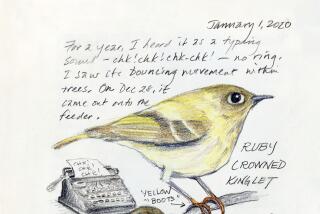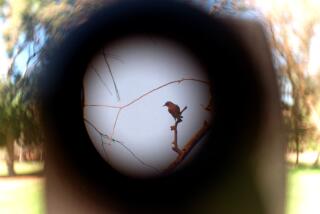An Essayist’s Quirky, Lucid Encounters With Nature’s World
- Share via
On an Amazon expedition described in a charming essay in “The Boilerplate Rhino,” David Quammen, along with a tropical biologist and a foundation executive, is sitting naked in an outdoor bathing place at dusk. Darkness falls, as it does near the Equator, with, as Quammen says, a “whump.”
And then, suddenly: “A large glob of orange light comes zigzagging through the trees. It moves slowly, flying a gracefully sinuous path, as though under command of Steven Spielberg. It is inexplicably weird, though pretty.”
After several passes through the dark, it gets caught in a net set to catch bats. It is a 2-inch-long beetle with an organ of luminescence. The tropical biologist has never seen it before.
Why, Quammen asks in this essay, titled “God’s Weakness for Beetles,” are there so many species of beetles in the world? Modern science has identified about 1 million species of animals. Mammals account for 4,000; 9,000 are birds; 10,500 are reptiles and amphibians. “Of the remainder,” Quammen writes, “a huge portion are insects and other anthropods--roughly 874,400.”
And, of that figure, about 290,000 are beetles. But why? There are theories, but they are only that. No one, Quammen says, knows the origin of species. Not even Charles Darwin knew, despite the title of his book.
Quammen, best known for his 1996 “The Song of the Dodo: Island Biogeography in an Age of Extinctions,” presents in “The Boilerplate Rhino” 26 columns on the natural world taken from the pages of Outside magazine. The columns are vintage Quammen--lucid, sometimes slightly quirky. He writes, for instance, of the hugely stinky durian fruit of Indonesia, and of the many kinds of penises to be found in animal species.
Always informative, Quammen is interested not only in the natural world but also in the scientists who study it and the writers who write about it.
He reprints here a fine essay about Henry David Thoreau, whose “Walden,” Quammen writes, “is a precious touchstone to me.” “Walden” is not about how to live alone in the woods, as some suppose. Rather, it’s a book about how to live in town. “My own view is that ‘Walden’ represents a great leap of ethical imagination”--Thoreau, Quammen says, was re-imagining the way a human might conduct his life.
Ethics is a principal theme in Quammen’s writings: how man ought to behave himself in the natural world. In “The Boilerplate Rhino,” he puts it most clearly in the essay “Who Swims with the Tuna,” a look at the protests against catching tuna with nets that drown dolphins. He opposes the nets, not because dolphins are cute but because 6 million dolphin deaths over 30 years just to get cheap tuna has been “unconscionably wasteful.” “The Boilerplate Rhino”--the title essay refers to the Albrecht Durer woodcut of the rhino King Manuel I of Portugal was given from India--shows again why Quammen is one of America’s most principled and stimulating nature writers.
More to Read
Sign up for our Book Club newsletter
Get the latest news, events and more from the Los Angeles Times Book Club, and help us get L.A. reading and talking.
You may occasionally receive promotional content from the Los Angeles Times.










